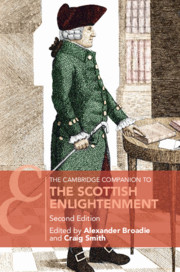Book contents
- The Cambridge Companion to the Scottish Enlightenment
- Series page
- The Cambridge Companion to the Scottish Enlightenment
- Copyright page
- Contents
- Contributors
- Acknowledgements
- Chronology of Events Relating to the Scottish Enlightenment
- Introduction
- 1 Several Contexts of the Scottish Enlightenment
- 2 Religion and Rational Theology
- 3 The Human Mind and Its Powers
- 4 Anthropology
- 5 Science in the Scottish Enlightenment
- 6 Scepticism and Common Sense
- 7 Moral Sense Theories and Other Sentimentalist Accounts of the Foundations of Morals
- 8 The Political Theory of the Scottish Enlightenment
- 9 Political Economy
- 10 Natural Jurisprudence and the Theory of Justice
- 11 Legal Theory in the Scottish Enlightenment
- 12 Sociality and Socialisation
- 13 Historiography
- 14 Art and Aesthetic Theory
- 15 Literature and Sentimentalism
- 16 The Impact on America
- 17 The Nineteenth-Century Aftermath
- Select Bibliography
- Index
- Series page
1 - Several Contexts of the Scottish Enlightenment
Published online by Cambridge University Press: 04 October 2019
- The Cambridge Companion to the Scottish Enlightenment
- Series page
- The Cambridge Companion to the Scottish Enlightenment
- Copyright page
- Contents
- Contributors
- Acknowledgements
- Chronology of Events Relating to the Scottish Enlightenment
- Introduction
- 1 Several Contexts of the Scottish Enlightenment
- 2 Religion and Rational Theology
- 3 The Human Mind and Its Powers
- 4 Anthropology
- 5 Science in the Scottish Enlightenment
- 6 Scepticism and Common Sense
- 7 Moral Sense Theories and Other Sentimentalist Accounts of the Foundations of Morals
- 8 The Political Theory of the Scottish Enlightenment
- 9 Political Economy
- 10 Natural Jurisprudence and the Theory of Justice
- 11 Legal Theory in the Scottish Enlightenment
- 12 Sociality and Socialisation
- 13 Historiography
- 14 Art and Aesthetic Theory
- 15 Literature and Sentimentalism
- 16 The Impact on America
- 17 The Nineteenth-Century Aftermath
- Select Bibliography
- Index
- Series page
Summary
When and how did the Scottish Enlightenment take shape? What were its major influences - Scottish, English, European and other? Can we account for its unique character? Who were its major players? What did they want and achieve? Answers to these basic questions hinge on the debatable nature of the Scottish Enlightenment. Regardless of where one’s emphases fall or the tenor of the Scottish Enlightenment one sees, there is no single context for it. This chapter explores several which were important for all of them.
The Scottish Enlightenment was situated in a particular geography and climate and within distinct population trends. Patrons were important to it. So, too, were institutional contexts and the wider eighteenth-century Republic of Letters. While Edinburgh was at the heart of the Scottish Enlightenment, Glasgow and Aberdeen provide other and differing contexts.
We find that the contexts shaping the Scottish Enlightenment differed from those elsewhere. Culturally diverse and eager for improvement from the late seventeenth century, by 1800, the Scots could boast of an Enlightenment to which belonged several of the century’s best philosophers and historians, its most accomplished political economist and many notable social thinkers, scientists and medical men, rhetoricians, theologians and artists. Their works circulated widely, engendering debate and excitement in Britain, on the Continent and in America.
Keywords
- Type
- Chapter
- Information
- Publisher: Cambridge University PressPrint publication year: 2019
- 1
- Cited by

